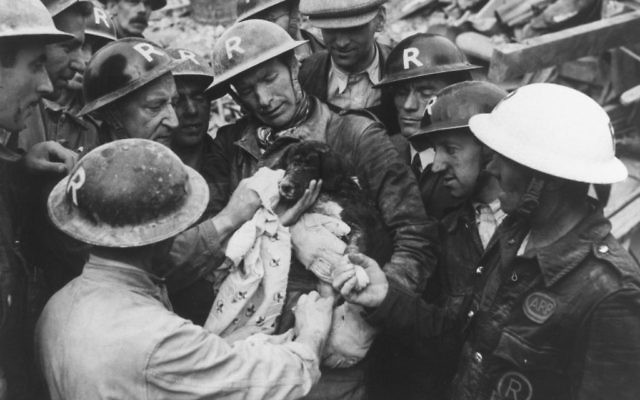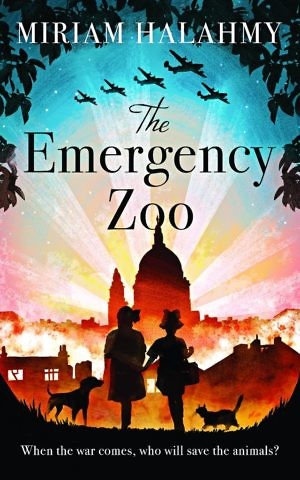The Emergency Zoo: The cats and dogs of war
Author Miriam Halahmy has based her latest children’s book on the shocking story of Britain’s pet cull during the war,
Alex Galbinski is a Jewish News journalist
As an author with a passion for history, Miriam Halahmy is quite used to translating snippets of past events or current affairs into storylines in her books. But for her latest book, The Emergency Zoo, she was shocked to uncover the little-known subject of the hundreds of thousands of household pets that were put down in 1939.
“I read a news article on my phone just over a year ago which said that 750,000 pets were put to sleep at the outbreak of the Second World War. I was absolutely astonished,” she recalls.
“I have read enormous amounts about the 20th century, but I had never heard this story.”
As she started her research, she learned about Bonzo’s War, a book by Clare Campbell about pets in the 1939-45 conflict but, she says: “There was so much more to find out and this led to a great deal of research in books, online and reading the diary entries in the Mass Observation archive at the British Museum.”
She saw immediately the potential for a novel in a terrible episode in British history and decided it would make a wonderful children’s book.
The Emergency Zoo begins the weekend before war is declared after a summer when people were already putting their pets down.
It centres around the stories of 12-year-old friends Tilly and Rosy, who try to outwit their families and the authorities by hiding their pets in a derelict hut in the woods. Soon, other children start bringing their own pets – rabbits, guinea pigs and hamsters, turning the girls’ secret den into the ‘emergency zoo’.
Halahmy’s research was very specific. “I was searching for tiny details about what was happening on each day in the lead-up to the outbreak of war,” she explains. “But the history books don’t focus on those final days of August, so I turned to the Mass-Observation diaries and I was able to read entries for each day.”
She discovered that, at 11.15 am on Sunday, 3 September 1939, the entire country listened to the prime minister state on the radio that Britain was now at war with Germany. Immediately after the broadcast, the air-raid sirens sounded and everyone went down to the shelters.
“According to accounts at the time, when the all-clear sounded people literally picked up their pets and set off for the vet to have them put down,” Halahmy explains.
“There were queues down the streets up to half a mile long. It is an astonishing fact of that first morning of war.
“I very much enjoy this kind of research, winkling out each tiny fact which can really help to bring the period alive.”
I ask Halahmy, who has recently become a grandmother, how she managed to translate the terrible episode into a story for children without terrifying them (the book is aimed at readers aged from eight).
She tells me: “My book asks the question: ‘When the war comes, who will save the animals?’ This is the cover strapline and I think that, in this way, although there are some difficult scenes in the book, the story will be seen by the children as positive; a call to action and an example of how ordinary people can do extraordinary things when faced with a dilemma.”
The killing of pets went on for a week, during which an estimated 750,000 of them – mainly cats and dogs – were put down. Many other animals were destroyed too, including pet monkeys, caged birds and all the poisonous animals housed in London Zoo.
Halahmy found out that the government circulated a pamphlet and announced on the radio that pets would not be allowed in public shelters. The pamphlet read: ‘If you cannot place them in the care of neighbours, it is really kindest to have them destroyed.’
“It was believed that pets could not be fed once rationing started and they wouldn’t cope with gas and bomb attacks. But the public came to their senses at the end of that week and the cull slowed to a halt,” she explains.
“In a nation of pet lovers, it seems that everyone quietly forgot about it and it has only just resurfaced in the past couple of years.”
There is also a Jewish angle in the book. “I read an extraordinary letter from two Jewish children with a place on the Kindertransport,” explains Halahmy, who lives in Golders Green.
“They wrote to the Dumb Friends’ League in London, begging it to take their dog, Barbara. They wrote saying ‘We are very poor refugee children and we love Barbara who would die if we abandoned her’.
“The league went ahead and paid for the quarantine of the children’s dog and the dogs of many other refugees too, recognising how important the pets would be to people who had lost everything.”
Halahmy really wanted to feature a storyline including a Kindertransport child and a dog and was keen to interview a former Kinder to ensure she had original information. She met Ann Kirk, who was born in Germany and who let her read her mother’s letters (her husband Bob, who was also a former Kind, translated them for her); Halahmy included extracts from these letters in her novel.
“I have imagined the story of the two children, Lotte and Rudi, but they are influenced by the story of a survivor I knew personally and also my own recent visit to Frankfurt, which I made their home town,” she says.
Halahmy, who is the author of eight books – one for adults, two for children and five for young adults – hopes her readers will “simply enjoy reading about pets, their care, the fun they can be and how important they are to their owners”.
She also wanted to show modern children how their counterparts in the 1930s had so much more freedom. “They would say goodbye to their families after breakfast and not return until teatime. But I also show how much stricter parents were in those days. Woe betide anyone who was late for tea!” she laughs.
“I hope my book will convey the message that children are really very capable at tackling serious problems and although my solutions are imagined, they show how resourceful children can be.”
• Emergency Zoo by Miriam Halahmy is published by Alma Books, priced at £6.99, and is out on 26 May
Above: Rescue workers taking care of a dog amid the rubble left by a bombing raid on Britain during the Second World War; left, author Miriam Halahmy included the experiences of a Kindertransport child in her book

Thank you for helping to make Jewish News the leading source of news and opinion for the UK Jewish community. Today we're asking for your invaluable help to continue putting our community first in everything we do.
For as little as £5 a month you can help sustain the vital work we do in celebrating and standing up for Jewish life in Britain.
Jewish News holds our community together and keeps us connected. Like a synagogue, it’s where people turn to feel part of something bigger. It also proudly shows the rest of Britain the vibrancy and rich culture of modern Jewish life.
You can make a quick and easy one-off or monthly contribution of £5, £10, £20 or any other sum you’re comfortable with.
100% of your donation will help us continue celebrating our community, in all its dynamic diversity...
Engaging
Being a community platform means so much more than producing a newspaper and website. One of our proudest roles is media partnering with our invaluable charities to amplify the outstanding work they do to help us all.
Celebrating
There’s no shortage of oys in the world but Jewish News takes every opportunity to celebrate the joys too, through projects like Night of Heroes, 40 Under 40 and other compelling countdowns that make the community kvell with pride.
Pioneering
In the first collaboration between media outlets from different faiths, Jewish News worked with British Muslim TV and Church Times to produce a list of young activists leading the way on interfaith understanding.
Campaigning
Royal Mail issued a stamp honouring Holocaust hero Sir Nicholas Winton after a Jewish News campaign attracted more than 100,000 backers. Jewish Newsalso produces special editions of the paper highlighting pressing issues including mental health and Holocaust remembrance.
Easy access
In an age when news is readily accessible, Jewish News provides high-quality content free online and offline, removing any financial barriers to connecting people.
Voice of our community to wider society
The Jewish News team regularly appears on TV, radio and on the pages of the national press to comment on stories about the Jewish community. Easy access to the paper on the streets of London also means Jewish News provides an invaluable window into the community for the country at large.
We hope you agree all this is worth preserving.
























